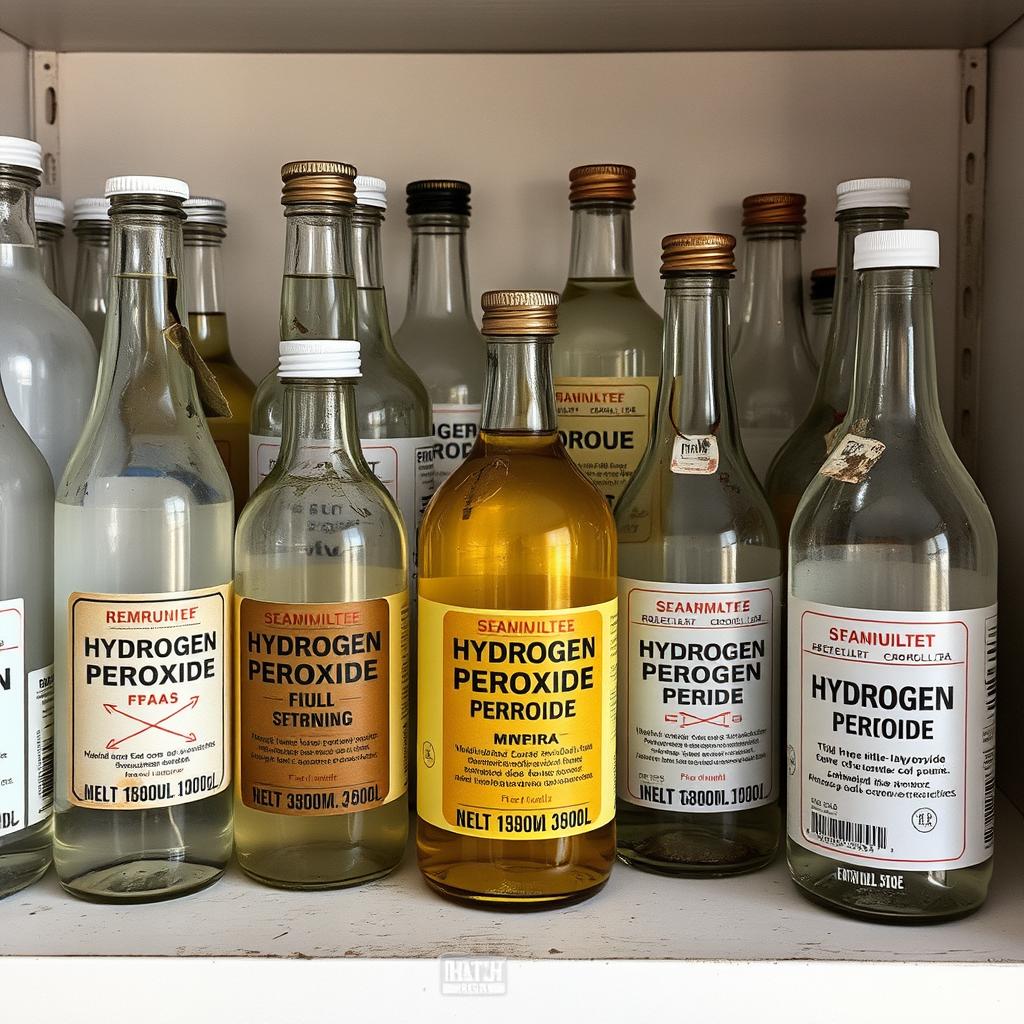Hydrogen peroxide is a common item in many homes. But, many wonder if it can expire. The answer is yes, it can expire. It’s not very stable and breaks down fast. In a sealed container, it lasts about 3 years. Knowing how long hydrogen peroxide lasts is key to using it right. When we ask if hydrogen peroxide can expire, we must think about what affects its stability. Its shelf life can change based on how it’s stored and if it’s exposed to light. Once you open it, it starts to lose its power. Exploring hydrogen peroxide’s expiration is complex. It involves learning about its properties and uses in the home. The question of whether hydrogen peroxide can expire is just the start of a bigger conversation about its shelf life and how stable it is.
Click to use Silverigroup personal shopper services
Key Takeaways:
- Hydrogen peroxide can expire, and its shelf life is about 3 years in a sealed container.
- The shelf life of hydrogen peroxide can change based on storage and light exposure.
- After opening, hydrogen peroxide loses its strength.
- Knowing what affects hydrogen peroxide’s stability is crucial for safe use.
- Hydrogen peroxide is not very stable and breaks down quickly, making its shelf life important.
- The question of whether hydrogen peroxide can expire is vital to its use in the home.
Understanding Hydrogen Peroxide: Basic Properties and Uses
Hydrogen peroxide is a versatile chemical with many uses. Its hydrogen peroxide stability is key to its effectiveness. Knowing how it expires helps us understand its properties and uses. At home, hydrogen peroxide is used for cleaning and disinfecting. How you store it affects its stability and use. Storing it right can make it last longer.
Click to buy citric acid from Silvairgroup
Chemical Composition and Stability
Hydrogen peroxide is made of hydrogen and oxygen. Its stability is important for its shelf life. Temperature, light, and storage conditions all impact its stability.
Common Household Applications
Hydrogen peroxide is used in many ways at home. It includes:
- Disinfecting wounds and cuts
- Cleaning surfaces and removing stains
- Bleaching hair and teeth
Different Concentration Levels
Hydrogen peroxide comes in various strengths, from 3% to 35%. The strength affects its stability and use. Higher strengths are more stable but also more dangerous if not handled carefully.
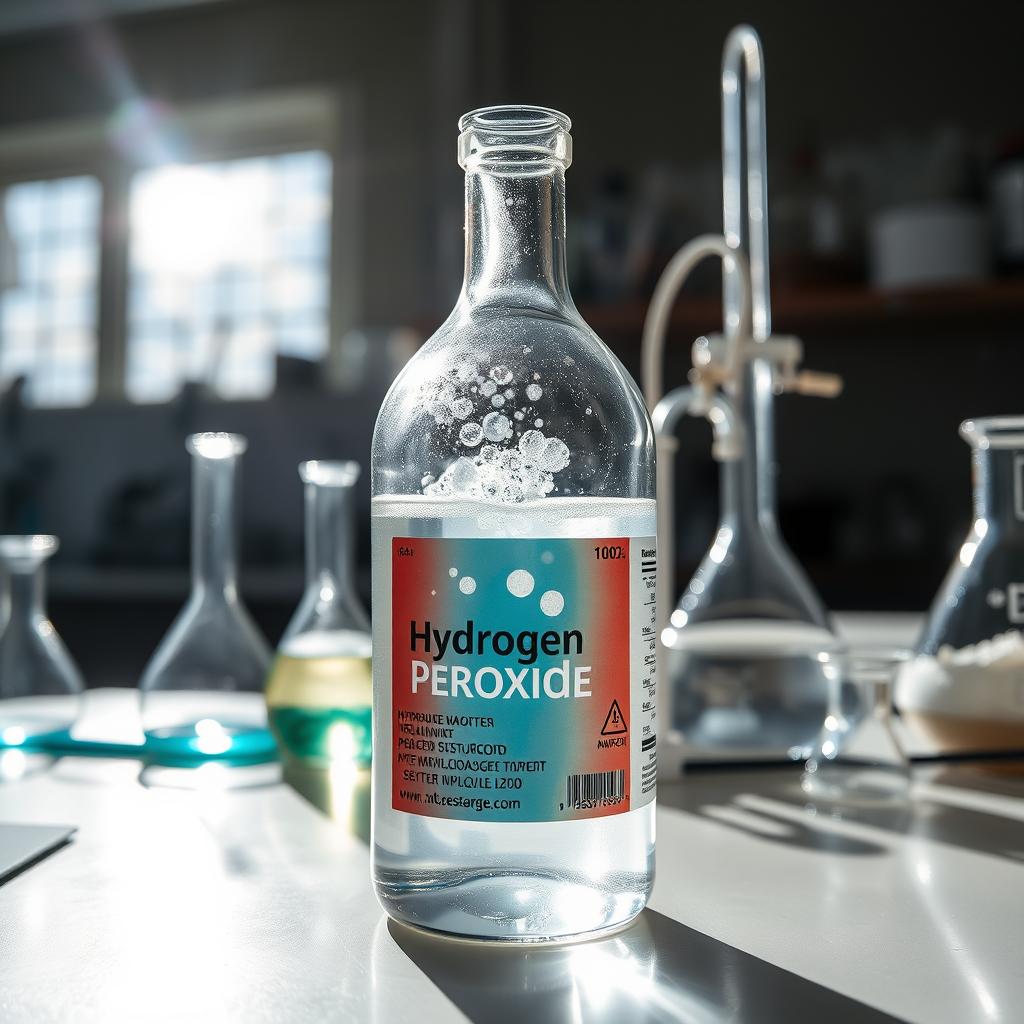
Knowing about hydrogen peroxide’s properties and uses is crucial. By understanding hydrogen peroxide stability and hydrogen peroxide storage, we can use it safely and effectively.
| Concentration Level | Stability | Effectiveness |
|---|---|---|
| 3% | Low | Low |
| 35% | High | High |
The Shelf Life of Unopened Hydrogen Peroxide
Hydrogen peroxide is a common item in homes. It’s used for cleaning, disinfecting, bleaching hair, and whitening teeth. When kept in a sealed container, it can last about 3 years. Knowing the hydrogen peroxide expiration date is key to its effectiveness and safety. The shelf life of unopened hydrogen peroxide depends on a few things. These include storage conditions and the solution’s concentration. A 3% solution, common in homes, lasts longer when stored in a cool, dry place, away from sunlight. Several factors influence hydrogen peroxide’s shelf life:
- Storage conditions: Temperature, humidity, and light can affect its stability.
- Concentration: Different concentrations have different shelf lives.
- Container: The type of container used also impacts shelf life.
Click to buy frozen a grade beluga fish from Silverigroup
To know how long does hydrogen peroxide last, check the hydrogen peroxide expiration date on the label. Follow proper storage guidelines to keep it effective and safe.
Proper storage and handling of hydrogen peroxide are crucial. Always check the label for storage conditions and follow the manufacturer’s guidelines. This way, you can get the most out of your hydrogen peroxide.
| Concentration | Shelf Life | Storage Conditions |
|---|---|---|
| 3% | Approximately 3 years | Cool, dry place, away from direct sunlight |
Can Hydrogen Peroxide Expire Before Opening?
Hydrogen peroxide can expire before you even open it. This happens if it’s not stored right or if the container gets damaged. Hydrogen peroxide degradation is the main reason. It occurs when the solution meets certain environmental factors. The effects of expired hydrogen peroxide are quite noticeable. It loses its power to disinfect. This can lead to expired hydrogen peroxide effects that affect its use.
To avoid early expiration, always check the manufacturing date. Store it in a cool, dry spot. The sealed container usually lasts 2-3 years, but this can change based on where you store it. For unopened bottles, keep them away from sunlight and heat. Make sure the container is tightly sealed. This helps keep the solution fresh.
- Temperature: Store in a cool, dry place to prevent degradation
- Light exposure: Avoid direct sunlight, as this can cause the solution to break down
- Container material: Ensure the container is made of a material that is compatible with hydrogen peroxide, such as plastic or glass
By following these tips, you can make your hydrogen peroxide last longer. Always check the expiration date and store it correctly. This way, the solution stays effective and safe to use.
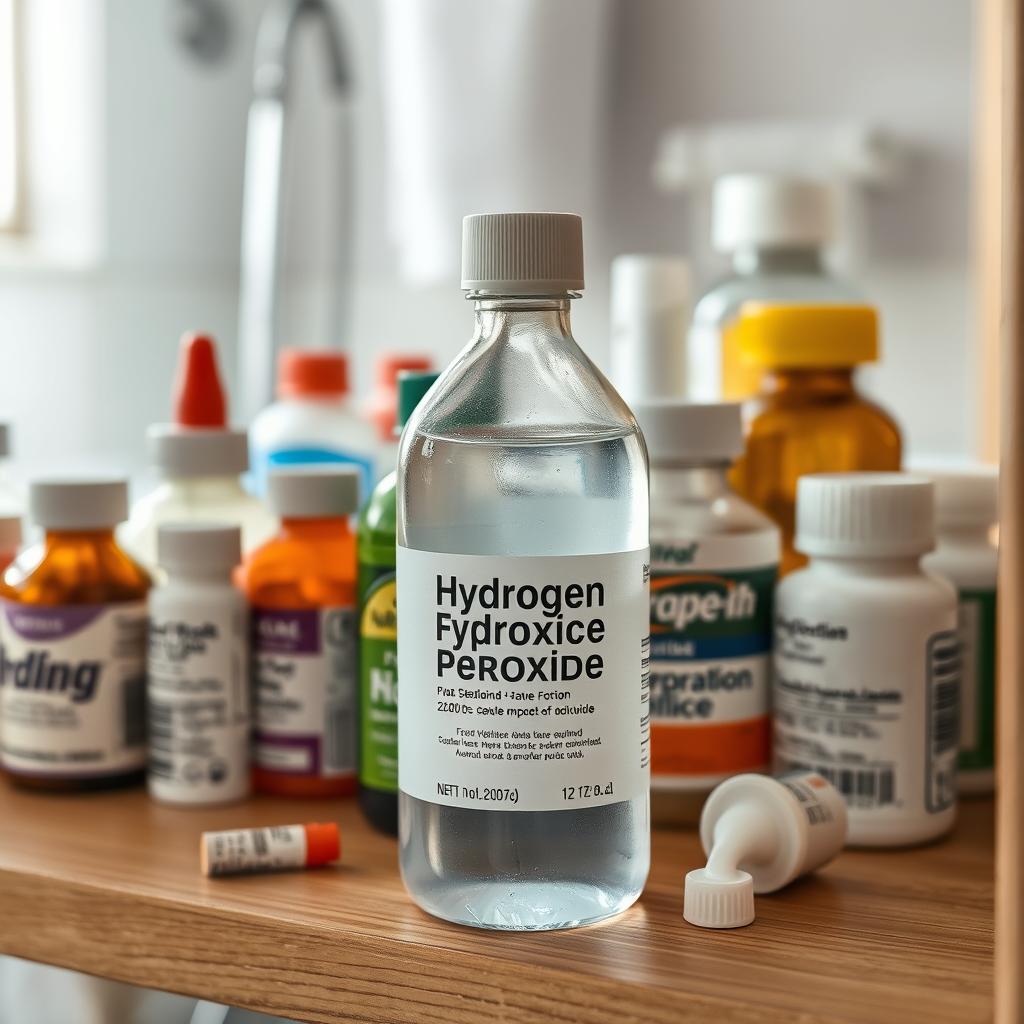
What Happens After Opening the Bottle
When you open a bottle of hydrogen peroxide, its hydrogen peroxide shelf life starts to go down. The active parts in hydrogen peroxide begin to break down. This makes it less effective over time.
This change in hydrogen peroxide stability means you should use it quickly. This way, you get the most out of it. Opened hydrogen peroxide usually stays good for 1 to 6 months. After that, it can’t disinfect and sanitize as well. To use hydrogen peroxide effectively, follow these tips:
- Always check the expiration date or the manufacturing date on the bottle before opening it.
- Store the opened bottle in a cool, dry place, away from direct sunlight.
- Keep the bottle tightly sealed when not in use to minimize exposure to air.
Knowing how hydrogen peroxide stability and hydrogen peroxide shelf life work can help you use it better. By using it within the recommended time and storing it right, you keep it effective and safe. It’s important to know how hydrogen peroxide changes after you open it. By keeping it stable, you can enjoy its benefits safely and effectively.
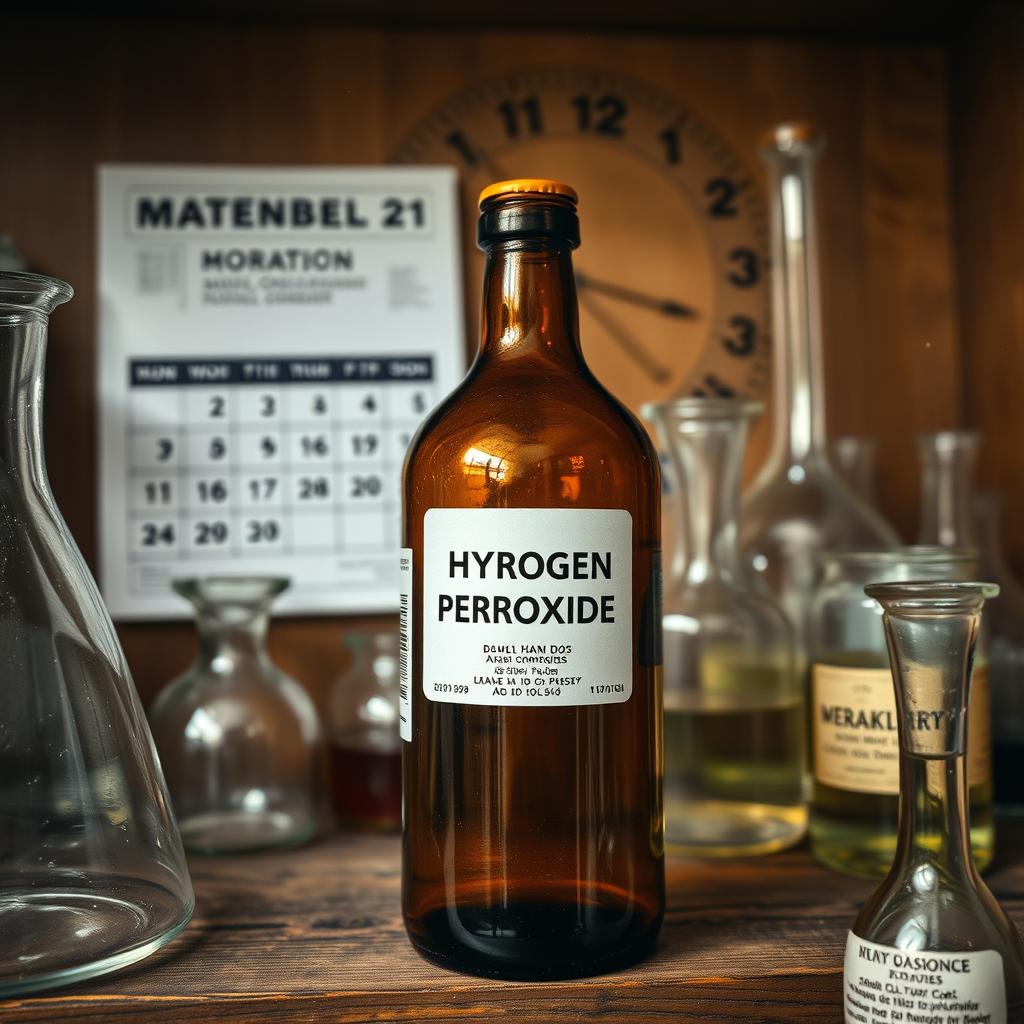
Signs Your Hydrogen Peroxide Has Expired
Hydrogen peroxide can go bad, and it’s key to know when it has. Look for signs of expired hydrogen peroxide effects to use it safely and well. The main sign is hydrogen peroxide degradation, which you can spot by looking and testing. Some common signs of expired hydrogen peroxide include:
- Discoloration or sedimentation in the liquid
- Reduced effectiveness in cleaning or disinfecting
- Unpleasant odor or smell
Knowing these signs helps avoid using expired hydrogen peroxide. This can make it less effective or even harmful to your health. By spotting hydrogen peroxide degradation, you keep this common household item safe and useful. Checking your hydrogen peroxide regularly for expiration signs keeps your space safe and healthy. If you’re not sure if it’s still good, it’s safer to get a new one.
| Signs of Expired Hydrogen Peroxide | Description |
|---|---|
| Discoloration | Change in color or sedimentation in the liquid |
| Reduced Effectiveness | Decreased ability to clean or disinfect |
| Unpleasant Odor | Strong or unpleasant smell |
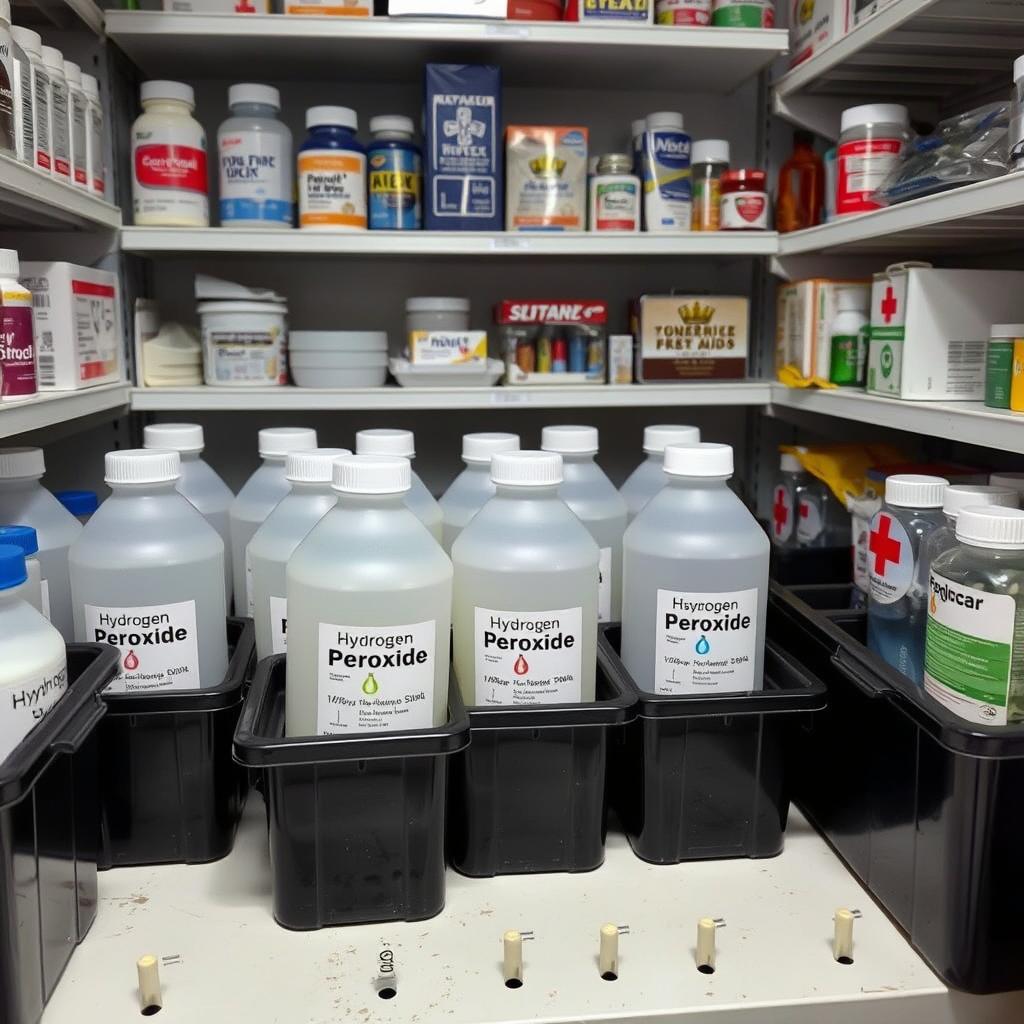
Proper Storage Methods to Extend Shelf Life
To make your hydrogen peroxide shelf life last longer, proper storage is key. You need to think about temperature, light, and the type of container. Following these tips will help keep your hydrogen peroxide effective for longer.
For hydrogen peroxide storage, a cool, dry spot is best. Think about a cupboard or closet that’s away from sunlight and heat. Always keep the container closed to stop contamination and evaporation. Here are some important storage tips for hydrogen peroxide:
- Keep it out of reach of kids and pets
- Don’t store it near things that can catch fire
- Check the expiration date and replace it when it’s time
By following these easy steps, you can make your hydrogen peroxide shelf life last longer. Proper hydrogen peroxide storage is important for keeping it strong and safe.
Remember, the right storage is crucial for using your hydrogen peroxide well. By storing it correctly, you can make it last longer and keep it useful at home.
Safety Considerations for Using Aged Hydrogen Peroxide
Using old hydrogen peroxide can be risky. It’s important to know when to throw it away and how to do it safely. Knowing how hydrogen peroxide breaks down is key to using it right.
Old hydrogen peroxide might not work as well, could be contaminated, or cause unstable reactions. It’s crucial to be aware of these dangers and take steps to stay safe. To handle and dispose of old hydrogen peroxide safely, follow these tips:
- Check the expiration date and look for signs of degradation, such as discoloration or sedimentation.
- Store hydrogen peroxide in a cool, dry place, away from direct sunlight and heat sources.
- Dispose of expired or degraded hydrogen peroxide according to local regulations and guidelines.
By focusing on safety and taking the right precautions, you can reduce risks from using old hydrogen peroxide. This ensures a safe and effective experience.
| Hydrogen Peroxide Concentration | Shelf Life | Storage Conditions |
|---|---|---|
| 3% | Up to 3 years | Cool, dry place |
| 6% | Up to 2 years | Cool, dry place, away from light |
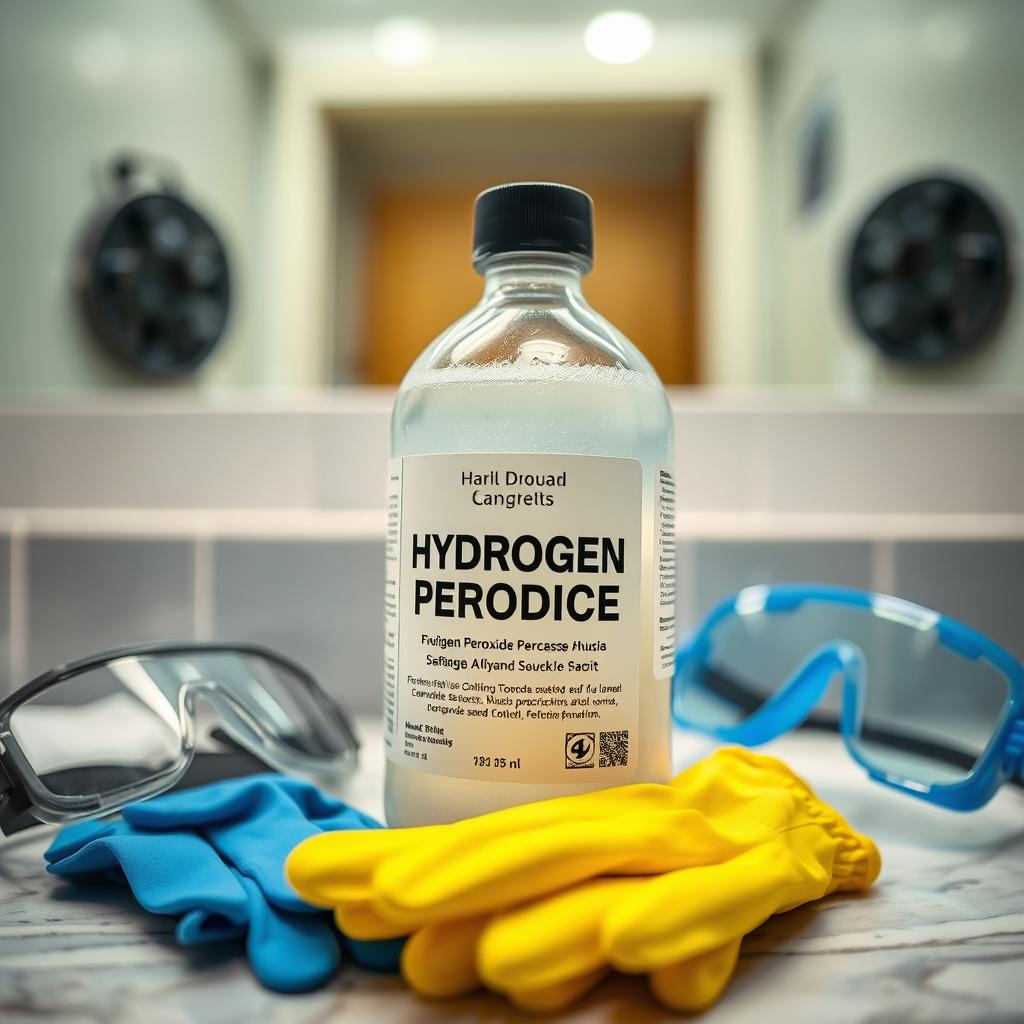
Environmental Factors Affecting Stability
Hydrogen peroxide’s stability is influenced by several factors. These include temperature, light, and the material of the container. Knowing these factors helps keep hydrogen peroxide effective. Storing it properly is key to reducing their impact. Temperature is a big factor in hydrogen peroxide stability. High temperatures can break it down, reducing its effectiveness. But, low temperatures slow down this breakdown, helping to keep hydrogen peroxide stable.
Temperature Impact
It’s important to store hydrogen peroxide in a cool, dry place. Avoid areas near heat or direct sunlight. This helps keep the temperature stable and preserves the hydrogen peroxide.
Light Exposure Effects
Light, especially UV, can also affect hydrogen peroxide. UV light can break it down, reducing its effectiveness. Store it in a dark or opaque container to protect it from light.
Container Material Importance
The container material is also crucial. Use glass or HDPE containers, as they are safe for hydrogen peroxide. Avoid metal or PVC, as they can react with it.
Understanding how environment affects hydrogen peroxide stability is important. Proper storage and handling can help keep it effective. This way, you can use hydrogen peroxide for longer periods.
Alternative Uses for Expired Hydrogen Peroxide
Even though expired hydrogen peroxide isn’t as good at killing germs, it still has uses. The expired hydrogen peroxide effects on its strength might make it less effective for some tasks. Yet, it can still clean and disinfect surfaces. This is because the hydrogen peroxide degradation process doesn’t make it completely useless. Here are some ways to use expired hydrogen peroxide:
- Cleaning mirrors and windows
- Disinfecting countertops and sinks
- Removing stains from clothing
It’s important to remember that expired hydrogen peroxide might not work as well. So, it’s best to use it with other cleaners to get the best results. By finding new uses for expired hydrogen peroxide, we can reduce waste and use up what we have.
Conclusion: Making the Most of Your Hydrogen Peroxide
Knowing when hydrogen peroxide expires helps you use it effectively. Whether it’s new or used, proper storage is key. Watch for any changes in its look or how it works to keep it fresh longer. Always check the “Best By” date on the bottle. Keep it away from heat and light. And, don’t forget to throw away expired peroxide safely. By following these steps, you’ll get the most out of hydrogen peroxide for all your cleaning needs.
FAQ: Can hydrogen peroxide expire?
Can hydrogen peroxide expire?
Yes, hydrogen peroxide can expire. It’s unstable and breaks down when exposed to air, heat, or light.
How long does hydrogen peroxide last?
Sealed hydrogen peroxide lasts about 3 years. But once opened, it’s only good for 1 to 6 months.
Can hydrogen peroxide expire before opening the bottle?
Yes, hydrogen peroxide can expire before you even open it. This can happen if it’s stored badly or if the container is damaged. Temperature, light, and the date it was made can also affect its shelf life.
What are the signs that hydrogen peroxide has expired?
Signs of expired hydrogen peroxide include bubbling or color changes. It might also not work as well. Always check for these signs to make sure it’s safe and effective.
How can I properly store hydrogen peroxide to extend its shelf life?
To keep hydrogen peroxide fresh, store it in a cool, dark place. Keep it away from sunlight and heat. Always seal the container tightly to prevent air from getting in. This helps keep it stable and effective.
What should I do with expired hydrogen peroxide?
Expired hydrogen peroxide can be risky, so it’s best to throw it away. If it’s past its expiration date or looks degraded, get a new bottle. Always follow local rules for safely getting rid of chemicals.

